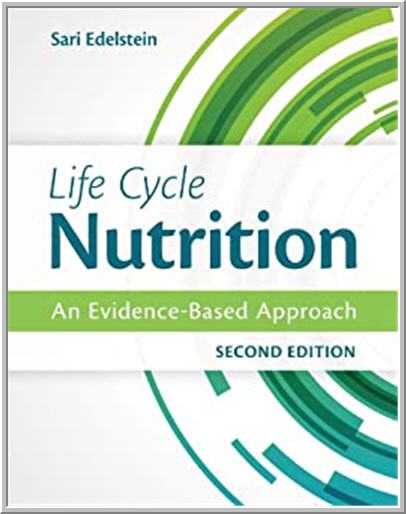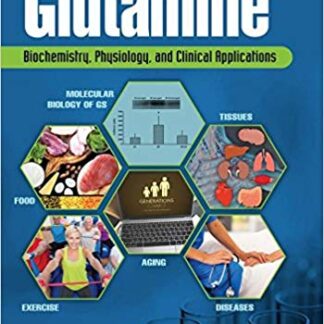Description
Life Cycle Nutrition: An Evidence-Based Approach 2nd Edition by Sari Edelstein, ISBN-13: 978-1284036671
[PDF eBook eTextbook]
- Publisher: Jones & Bartlett Learning; 2nd edition (March 19, 2014)
- Language: English
- 560 pages
- ISBN-10: 1284036677
- ISBN-13: 978-1284036671
Revised and updated with the latest epidemiologic research, the Second Edition of Life Cycle Nutrition: An Evidence-Based Approach explores nutritional foundations and the growth, development and normal functioning of individuals through each stage of life. With subjects as diverse as media influences on eating, skipping breakfast, fruit juice consumption, and clinical nutrition, this text gives students current knowledge, helps them evaluate emerging knowledge, and prepares them to uncover new knowledge for the public, their clients, and themselves. Key Features: Evidence-Based Practice sections contains research articles that provide students with an opportunity to create peer-reviewed studies and clinical trials. Cultural Diversity Sidebars, integrated throughout the text, present issues that challenge students to think critically about the nutritional and health differences among ethnic groups. Interesting Vignettes, based on nutrition and health, enhance student understanding of the material presented. Issues to Debate sections provides timely topics for debate and further consideration such as withholding and withdrawing nutrition, the ethical implications of nutrition care, and right to die case law. Students will learn the physiological, moral, ethical, and legal issues surrounding these emotionally charged issues. Case Studies and Nutritional Management help students develop knowledge and skills within a wide variety of subjects and improve critical thinking, public speaking, and group interactions.
Table of Contents:
Cover
Title Page
Copyright
Dedication
Brief Contents
Contents
Contributors
Preface
How to Use This Book
About the Editor
Section 1 Evidence-Based Nutrition in the Life Cycle: Prenatal to the Adolescent
Chapter 1 Nutrition Requirements During Pregnancy
Nutritional Status Prior to Pregnancy
The Fetal Origins Hypothesis
Maternal Preconception Weight Status
Preexisting Conditions
Public Health Campaigns to Improve Preconception Nutritional Status
General Health and Nutrition Recommendations for Women Preconception
Nutrient Needs During Pregnancy
Total Energy
Protein
Lipids and Fats
Fiber
Carbohydrates
Vitamin A
Vitamin D
Calcium
B Vitamins
Iron
Magnesium
Zinc
Iodine
Fetal Development
The Embryonic Phase
The Fetal Phase
Critical Periods of Nutrient Intake During Embryonic and Fetal Development
Common Problems Associated with Pregnancy
Nausea and Vomiting of Pregnancy and Food Aversions and Cravings
Reflux
Pica
Preeclampsia
Gestational Diabetes
The Interaction of Lifestyle and Pregnancy
Physical Activity, Safety, and Energy Needs
Food Safety
Alcohol
Illegal Drug Use
Cigarette Smoking
Caffeine
Summary
Case Study 1 Nutrition Prior to Pregnancy
Case Study 2 Gestational Diabetes
Case Study 3 Weight Gain During Pregnancy
Case Study 4 Vegetarian Pregnancy
References
Special Section on Lactation Nutrition
Breastfeeding Trends
Maternal Nutrition and Breastfeeding
Macronutrients
Micronutrients
Summary
References
Chapter 2 Normal Infant Nutrition
Normal Infant Nutrition
Nutrition Recommendations for Normal Infant Feeding
Breast Milk Composition
Formula Feeding
Contraindications to Breastfeeding
Expression, Handling, and Storage of Human Milk
Donor Human Milk
Early Feeding
Colic
Research About Colic
Food Safety
Safe Handling of Infant Formula
Nitrates
Risks of Infant Formula and Bottle-Feeding
Safe Handling of Complementary Foods
Growth
Adequate Growth in Infancy
Development of Growth Charts
Nutrient Requirements
Energy
Protein
Fatty Acids
Iron
Zinc
Vitamin D
Supplemental Nutrients
Vegetarianism
Complementary Feeding
Transitioning from All Milk to Family Foods
Feeding Guidelines
Complementary Foods and Growth
Meal Patterns and Nutrient Intakes
Food Trends and Preferences
Feeding Skills and Neuromuscular Development
Reflexes
Advanced Motor Skills
Chewing Ability
Determinants of Food Acceptance
Caregiver Behaviors
Effect of Feeding Mode in Infancy
Feeding Relationship
Portion Size
Special Supplemental Nutrition Program for Women, Infants, and Children
Case Study 1 Vitamin D Deficiency in Early Infancy
Case Study 2 Normal Infant Nutrition
Case Study 3 Infant Nutrition
Case Study 4 Failure to Thrive
Case Study 5 Failure to Thrive and Breastfeeding
Issues to Debate
References
Special Section on the Social and Cultural Aspects of Breastfeeding
A Brief History of Breastfeeding
Current Trends Affecting Breastfeeding
Who Breastfeeds?
Barriers to Breastfeeding
Routine Maternity Care Practices
Physiologic and Psychological Factors
Social Support and Acculturation
Marketing of Breast Milk Substitutes
Returning to Work
Legislation: Protecting a Woman’s Right to Breastfeed
References
Special Section on Postpartum Depression and Maternal Nutrition
References
Chapter 3 Normal Nutrition for Toddler Through School-Aged Children and the Role of Parents in Promoting Healthy Nutrition in Early Childhood
Normal Nutrition for Toddler Through School-Aged Children
Growth Expectations
Energy and Nutrient Needs
Protein
Fat
Vitamins and Minerals
Calcium
Vitamin D
Iron
Vitamin Supplements
Fluoride
Water
Whole Milk
Foods at 1 Year
Mealtime with Toddlers
Introducing New Foods
Planning Children’s Meals
Hunger and Behavior
Picky Eating
Grazing
Failure to Thrive
Lactose Intolerance
Television Watching and Media Influence on Food Cravings
Learning Through Participation
Choking Prevention
Snacks
Dental Health
Role Models
Breakfast
Nutrition at School
Physical Activity
Excessive Weight Gain
Supplements for Increased Calories
Role of Parents in Promoting Healthy Nutrition in Early Childhood
Eating Is a Learned Behavior: Acquisition of Flavor and Food Preferences
Neonatal and Early Infant Weight Gain
Development of Food Preferences
Feeding Infants and Toddlers Studies, 2002 and 2008
Feeding Infants and Toddlers Study
Parents
Modeling
Self-Regulation
Disordered Eating
Parenting Styles
Anticipatory Guidance
Talking Points
Helping Your Child Stay Healthy at 12 to 15 Months
Summary
Case Study 1 Lactose Intolerance in Children
Case Study 2 Picky Eater
Case Study 3 Snack Foods
Case Study 4 Obesity
References
Chapter 4 Normal Adolescent Nutrition
Growth and Development
Physical Growth
Hormonal Mediators of the Adolescent Growth Spurt
Fracture Risks
Gender Hormones
Assessment of Growth and Development
Adolescent Growth Disorders
Cognitive and Psychosocial Development During Adolescence
Cognitive and Affective Development
Psychosocial Development
Nutrient Requirements and Temporal Consumption Trends
Macronutrients
Minerals
Vitamins
Dietary Patterns
Serving Size
Food Groups
Skipping Breakfast
Added Sugars
Fast Food Consumption
Sociodemographic Moderators of Dietary Intake
Influence of Advertising
School Food Environment
Health Status of U.S. Adolescents
Excessive Weight and Obesity
Metabolic Syndrome
Other Health Issues
Iron Deficiency
Tobacco Use and Nutritional Status
Adolescent Pregnancy
Body Dissatisfaction, Dieting, and Eating Disorders
Issues to Debate
Case Study Adolescent Nutrition
References
Special Section on Public Health Nutrition Programs for Children
Critical Need for Pediatric Public Health Nutrition Services
Prematurity and Low Birth Weight
Obesity
Anemia
Breast Feeding
Hunger and Food Insecurity
Federal Public Health Nutrition Programs
Special Supplemental Nutrition Program for Women, Infants, and Children
Supplemental Nutrition Assistance Program
National School Lunch Program
School Breakfast Program
Summer Food Service for Children
Special Milk Program
Child and Adult Care Food Program
Commodity Supplemental Food Program
The Emergency Food Assistance Program
Team Nutrition
Expanded Food and Nutrition Education Program
Other Federal Programs that Respond to the Nutritional Needs of Infants, Children, and Adolescents
Head Start and Early Head Start
Early Intervention
Nutrition Surveillance Systems in the United States
Summary
Case Study Navigating Resources for Families
References
Chapter 5 Special Topics in Prenatal and Infant Nutrition: Genetics and Inborn Errors of Metabolism and Failure to Thrive
Genetics and Inborn Errors of Metabolism
Newborn Screening
Disorders of Amino Acid Metabolism
Phenylketonuria
Nutrition Management of Phenylketonuria
Tyrosinemia
Nutrition Management of Tyrosinemia
Disorders of Branched-Chain Amino Acid Metabolism
Maple Syrup Urine Disease
Nutrition Management of Maple Syrup Urine Disease
Disorders of Leucine Catabolism
Nutrition Management of IVA and 3-MCC
Disorders of Other Amino Acid Metabolism
Propionic Acidemia and Methylmalonic Acidemia
Nutrition Management of Propionic Acidemia and Methylmalonic Aciduria
Disorders of Nitrogen Metabolism
Urea Cycle Disorders
Nutrition Management of Urea Cycle Disorders
Disorders of Fatty Acid Oxidation
Mitochondrial Fatty Acid Oxidation Disorders
Nutrition Management of Fatty Acid Oxidation Disorders
Disorders of Carbohydrate Metabolism
Galactosemia
Nutrition Management of Galactosemia
Pyruvate Dehydrogenase Deficiency
Nutrition Management of Pyruvate Dehydrogenase Deficiency
Failure to Thrive
Classification of Failure to Thrive
The Cultural Diversity of Poverty
Assessment of the Patient with Failure to Thrive
Nutritional Interventions
Summary
Case Study 1 Inborn Errors of Metabolism
Case Study 2 Failure to Thrive
Issues to Debate
References
Special Section on Neonatal Intensive Care Nutrition: Prematurity and Complications
Nutrition Assessment
Calculating Corrected or Adjusted Age
Growth Goals
Estimating Nutrient Needs
Enteral Feeding and Prematurity
Feeding Evaluation
Powdered Formula in the NICU
Enteral Nutrition
Introduction of Solid Foods
Feeding Disorders
Fluid and Electrolyte Management
Parenteral Nutrition
Initiating Parenteral Nutrition
Vitamins and Trace Elements in Parenteral Nutrition
Other Parenteral Nutrition Additives
Parenteral Nutrition and Biochemical Monitoring
Parenteral Nutrition Complications
Osteopenia of Prematurity
Emerging Issues
Additional Neonatal Diagnoses and Nutritional Issues
Summary
References
Chapter 6 Special Topics in Toddler and Preschool Nutrition: Vitamins and Minerals in Childhood and Children with Disabilities
Vitamins and Minerals in Childhood
Vitamins
Water-Soluble Vitamins
Vitamin C Research
Fat-Soluble Vitamins
Vitamin A Research
Vitamin D Research
Vitamin E Research
Multiple Vitamin Supplementation
Minerals
Calcium
Iron
Magnesium
Magnesium and Respiratory Illness: A Connection?
Potassium
Phosphorus
Copper
Zinc
Zinc Research
Selenium
Iodine
Chromium
Children with Disabilities
Definitions
Etiology and Incidence
Nutrition Considerations
Nutrition Assessment
Biochemical Assessment
Dietary Information and Feeding Assessment
Chromosomal Aberrations
Down Syndrome
Down Syndrome Research
Special Olympics Serves Diversity
Community Resources
Prader-Willi Syndrome
GH Research
Neurologic Disorders
Spina Bifida
Cerebral Palsy
Autism
Attention Deficit Hyperactivity Disorder
Special Diets
Controversial Nutrition Therapies
Summary
Case Study 1 A Toddler with Cystic Fibrosis
Case Study 2 Vitamins and Minerals
Case Study 3 Developmental Diabilities (Down Syndrome)
Case Study 4 Developmental Diabilities (Prader-Willi Syndrome)
Issues to Debate
References
Chapter 7 Special Topics in School-Aged Nutrition: Pediatric Vegetarianism, Childhood Obesity, and Food Allergies
Pediatric Vegetarianism
Types of Vegetarian Diets
How Many Vegetarians Are There?
Vegetarianism and Cultural Diversity
Seventh-Day Adventists
Did You Know?
Growth and Energy Needs of Vegetarian Children
Nutritional Considerations
Critical Thinking About a Vegetarian Diet for a Child
Infants and Toddlers
A Word on Vegetarianism and Adolescents
Meal Planning Guidelines
Childhood Obesity
Assessment of Overweight Children
Obesity Rates in the United States
Global Rise in Obesity
Health Effects of Obesity
Health Disparities in Cultural Diversity
Environmental Influences on Obese Children
Societal Factors Influencing Overweight Children
2005 Dietary Guidelines for Physical Exercise
Obesity and Energy Balance
Dietary Trends Affecting Obese Children
Physical Inactivity Affecting Obesity in Children
School Physical Education
Opportunities to Intervene and Prevent Childhood Obesity
Nutrition Programs
Social Programs
Programs and Resources That Support Evidence-Based Practices in Preventing Childhood Obesity
Let’s Move!
5 A Day
MyPlate.gov
Food Allergies
Definitions
Food Additives
Prevalence
Allergy Incidence and Immediate Treatment
Other Reactions to Food Proteins
Food-Induced Anaphylaxis
Oral Allergy Syndrome
Celiac Disease or Gluten-Sensitive Enteropathy
Allergic Eosinophilic Esophagitis/Gastroenteritis
Diagnostic Evaluation
History and Physical Examination
Diet and Symptom Diaries
Laboratory Studies
Elimination Diets and Oral Food Challenges
Prevention of Food Allergies
Case Study 1 An Overweight Vegetarian
Case Study 2 An Underweight Vegetarian
Case Study 3 Vegetarian Toddler
Case Study 4 Infant Obesity
Case Study 5 School-Aged Child with Nut Allergy
Case Study 6 Childhood Food Allergy
Issues to Debate
References
Special Section on Celiac Disease
Celiac Disease/Gluten Enteropathy
Physiologic Description of Celiac Disease
Presentation
Prevalence
Diagnosis
Treatment
Hidden Sources of Gluten
Safe Foods
Nutritional Assessment
Noncompliance and Complications
Label Reading
Celiac Disease in Pediatrics
Quality of Life in the Pediatric Population with Celiac Disease
Potential Gluten-Containing Classroom Supplies
Summary
Case Study Celiac Disease
References
Chapter 8 Special Topics in Preadolescent and Adolescent Nutrition: Dietary Guidelines for Athletes, Pediatric Diabetes, and Disordered Eating
Dietary Guidelines for Athletes
Energy
Carbohydrate
Protein
Fat
Vitamins and Minerals
Iron
Calcium
Vitamin D
Fluid and Electrolytes
Preexercise Hydration
Hydration During Exercise
Postexercise Hydration
Nutrition During Exercise
Sport Beverages
Nutrition After Exercise
Alcohol, Caffeine, and Soda
Body Composition
Guidelines to Increase Muscle Mass
Weight and Fat Loss: Misconceptions and Bad Ideas
Weight Cycling
Eating Disorders and the Female Athlete Triad
Childhood Through Adolescence
Special Focus on Children and Adolescents
Dietary Supplements as Ergogenic Aids
Sports During Pregnancy, Lactation, and Menopause
Pediatric Diabetes
Incidence and Prevalence
Diagnosis of Diabetes in Children
Pathogenesis of Type 1 Diabetes in Children
Diabetes and Cultural Diversity
Pathogenesis of Insulin Resistance in Children
Other Diabetes Classifications in Children
Risk Factors for Diabetes
Associated Clinical Conditions
Management
The Role of Exercise
Disordered Eating
Anorexia Nervosa
Bulimia Nervosa
Eating Disorder Not Otherwise Specified
Psychiatric Comorbidity
Etiology and Course of Eating Disorders
Epidemiology
Medical Consequences of Eating Disorders
Assessment
Treatment
Treatment Goals
Inpatient Treatment
Outpatient Treatment
Therapeutic Alliance
Medical Nutrition Therapy
Psychotherapy
Special Populations
Males
Pregnancy
Athletes
Insulin-Dependent Diabetes Mellitus
Childhood Eating Disorders
Summary
Case Study 1 Pete Is a Tired Athlete
Case Study 2 Pediatric Type 1 Diabetes
Case Study 3 Eating Disorders
Issues to Debate
References
Section 2 Adult Evidence-Based Nutrition in the Life Cycle
Chapter 9 Special Topics in Adult Nutrition: Chronic Disease Nutritional Assessment
Definition of Adulthood
Young Adult Years: Ages 19 to 30 Years
Middle Adult Years: Ages 31 to 50 Years
Older Adult Years: Ages 51 to 70 Years
Nutritional Requirements for the Adult
Energy
Macronutrients
Micronutrients
Water
Fiber
Nutritional Assessment in Chronic Disease
Physiologic Changes in the Adult: Nutritional Implications
Assessment of Energy Needs in Adults with Chronic Disease
Nutritional Care Process and Model
Nutritional Assessment in Chronic Diseases
Cardiovascular Disease
Cancer
Chronic Obstructive Pulmonary Disease
Diabetes
Chronic Kidney Disease
HIV/AIDS
Nutritional Issues of Epidemic Proportion
Excessive Weight and Obesity
Osteoporosis
Summary
Case Study 1 Type 1 Diabetes Mellitus
Case Study 2 Management of End-Stage Renal Disease
Case Study 3 Body Weight and Lipids in HIV Infection
Issues to Debate
References
Chapter 10 Special Topics in Adults and Chronic Diseases: Nutrition and Public Health
Preventing Disease and Promoting Health
Chronic Diseases: The Leading Causes of Death and Disability
Risk Factors and Chronic Disease
Prevention Strategies
Primary Prevention: Health Promotion
Secondary Prevention: Risk Appraisal and Risk Reduction
Tertiary Prevention: Treatment and Rehabilitation
Implications of the Prevention Levels
Dietary Guidelines for Disease Prevention
Diet and Health: Nutrition Strategies and Risk Factors
Obesity
Weight Management
Cardiovascular Disease
Cancer
Diabetes
Osteoporosis
HIV/AIDS
Case Study 1 Cardiovascular Disease: Mr. Cohen’s Physical Examination Results
Case Study 2 Frequent Flier at Risk for Chronic Disease
Case Study 3 Osteoporosis
Issues to Debate
References
Chapter 11 Special Topics in Adult Nutrition: Physical Activity and Weight Management
Definitions of Obesity and Overweight
Total Energy Expenditure
Basal Metabolic Rate
Thermic Effect of Food
Thermic Effect of Exercise
Nonexercise Activity Thermogenesis
Physical Activity and Obesity Prevention
Definitions of Physical Activity and Exercise
Weight Loss Goals
How Much Exercise or Physical Activity Is Enough?
Physical Activity Interventions and Weight Loss
Physical Activity and Weight Loss in the Primary Care Setting
Cultural Diversity
How Can People Be Successful at Maintaining Weight Loss?
Summary
Case Study 1 Eating on the Run
Case Study 2 Pre-Diabetes
Issues to Debate
References
Chapter 12 Special Topics in Nutrition and the Older Adult: Diet, Lifestyle, Disease, and Pharmacologic Considerations
Pharmacotherapeutic Intervention in Obesity
Older Adults
Epidemiology
Aging
Aging Theories
Determinants of Successful Aging
Assessment Methodology
National Health Objectives
Macronutrient Intake
Micronutrient Intake
Dietary Patterns
Lifestyle Characteristics and Aging
Physical Activity
Body Habitus
Alcohol Use
Cigarette Smoking
Oral Health
Pet Ownership
Reproductive Hormone Levels
Marital Status
Mental Status
Mental Activity
Socioeconomics
Education
Social Support
Care Management Issues
Pharmacology in Older Adults
Pharmacotherapeutic Intervention in Obesity
Summary
Case Study Physical Activity in Baby Boomers
Issues for Debate
References
Chapter 13 Special Topics in Age-Related Risks: Unique Nutrition Issues in the Older Adult
Age-Related Risks for Malnutrition
Impaired Appetite
Physiologic Changes
Cognitive Changes
Psychosocial Changes
Medication Use
Interventions for Impaired Appetite
Oral Health Problems
Cultural Diversity
Swallowing Problems
Dry Mouth
Malnutrition and Nutrient Deficits
Weight Loss
Energy and Caloric Intake
Protein-Energy Malnutrition
Vitamin D
Thiamine
Vitamin B6
Vitamin B12
Fluid
Cultural Diversity
Nutrition-Related Health Problems
Cardiovascular Disease
Peripheral Vascular and Cerebrovascular Disease
Incontinence
Visual Function
Osteoporosis
Special Considerations for the Older Woman
Summary
Case Study 1 Risk of Malnutrition
Case Study 2 Lack of Appetite
References
Chapter 14 Special Topics Related to the Registered Dietitian and Older Adults: Roles and Responsibilities of the Registered Dietitian in Long-Term Care
Unique Characteristics of Long-Term Care
Types of Long-Term Care Centers
Nursing Home Regulation Drives Nutrition Care
Structure of the Nutritional Services Department
Roles of the Dietitian Within the Nutritional Services Department
Clinical Care Delivery in the LTC Setting
Nutrition Care Process and Timeline
Clinical RD Accountability in the LTC Setting
Discharge Education
Modified Diet Menu Writing and Approval and Modified Diet Prescriptions
Increasing and Maintaining Resident Food Intake
Cultural Diversity in LTC Facilities
Food Preparation
Food Safety and Sanitation
Critical Thinking on Nutrition Issues in LTC Facilities
Survey Management
Quality Management
Unique Role of the Consultant Dietitian in LTC
Summary
Case Study Increasing Appetite in Long-Term Care
Issues to Debate
References
Chapter 15 Special Topics in Nutrition and Ethics: Feeding and Ethical Issues at the End of Life
Artificial Nutrition and Hydration: Definition and Indications
Evidence about Long-Term Tube Feeding
Dehydration
Meaning of Food and Drink
Roles of the Registered Dietitian
Ethical Principles as a Framework for Decision Making
Legal Guidance
The Schiavo and Lee Cases
The Quinlan and Cruzan Cases
Advance Directives
Withdrawing or Withholding Treatment
Communication
Summary
Case Study Ethics
References
Appendix 1 Centers for Disease Control and Prevention Growth Charts
Appendix 2 Dietary Reference Intakes (DRIs)
Appendix 3 Body Mass Index for Adults
Appendix 4 Review for the Registered Examination for Dietitian
Registration Examination Test Specifications (Effective January 1, 2012)
Medical Nutrition Therapy for Various Chronic Diseases and Conditions Throughout the Life Cycle
Review of Common Medical Abbreviations
Summary of Common Modified and Mechanically Altered Diets
Review of Common Laboratory Values
Life Cycle Nutrition: Pregnancy and Lactation
Infant, Child, and Adolescent Nutritional Guidelines
Glossary
Index
Dr. Sari Edelstein is currently retired. Her previous position was of Associate Professor in the Nutrition and Dietetics Department at Simmons College. She taught both Food Science and Food service classes. Before coming to Simmons College, Dr. Edelstein has previously been in private practice and has served as a hospital Food Service Director and Chief Dietitian. She is the author of many research articles, inclusive of topics on ethics, yoga, the glycemic index, and athletic performance as well as the author or editor of books, which include: The Healthy Young Child, Wadsworth Publishing, 1995; Nutrition in Public Health, Second Edition, Jones & Bartlett Publishers, 2005; Nutrition: Rapid References for Nurses, Jones & Bartlett Publishers, 2007; Managing Food and Nutrition Services for the Hospitality, Culinary and NutritionProfessions, Jones & Bartlett Publishers, 2007; Life Cycle Nutrition: An Evidence-Based Approach, Jones & Bartlett Publishers, 2008. Education Background BS Florida State University MS Florida International University PhD University of Florida.
What makes us different?
• Instant Download
• Always Competitive Pricing
• 100% Privacy
• FREE Sample Available
• 24-7 LIVE Customer Support




